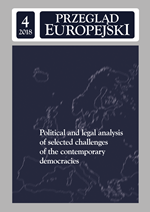The constitutional position of the Swiss parliament in the context of the principle of separation of powers
The constitutional position of the Swiss parliament in the context of the principle of separation of powers
Author(s): Maciej AleksandrowiczSubject(s): Politics / Political Sciences, Anthropology, Social Sciences, Political Sciences, Culture and social structure
Published by: Wydawnictwa Uniwersytetu Warszawskiego
Keywords: parliament; Swiss Confederation; separation of powers; parlament; Konfederacja Szwajcarska; podział władz
Summary/Abstract: This article considers the fundamental part of the Swiss constitution relating to the legal position of parliament and its powers. The regulatory provisions give the Federal Assembly significant predominance overother bodies of authority. The clearest example is the provision of the federal constitution that gives parliament oversight over the government, federal administration and federal courts. This provision, particularlygiven that the constitution makes no direct reference to the principle of separation of powers, may appearto indicate that state authority is unified in just one organ – contravening the model of democracy in whichthe principle of separation of powers is a fundamental element. It is shown here that it is unreasonable toread the constitutional provisions in a purely literal manner, and that they should be interpreted in the lightof the functions that the provisions in question are intended to fulfil, particularly in the context of the rulesof a democratic state.
Journal: Przegląd Europejski
- Issue Year: 2018
- Issue No: 4
- Page Range: 55-71
- Page Count: 17
- Language: English

